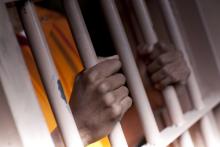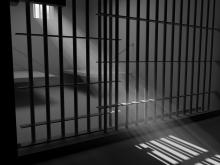Incarceration

The United States has the highest incarceration rate in the world — about 1.6 million people in 2010. Mass incarceration in our country is a problem, one that too often serves to line the pockets of for-profit prisons while tearing families apart and targeting people of color disproportionately.
Beyond Bars — a project to curb mass incarceration in the U.S. — produced the following video that puts faces to that problem. Watch the moving video below, and ask yourself the question: would putting them in prison serve the common good?

We started making our new documentary “Redemption of the Prosecutor” for the same reason we always do: someone told us a story.
Bill Mefford works in the social justice office of the United Methodist Church, and he called us last August to say he’d just seen an amazing talk. The talker was one Preston Shipp, a devout Christian and former prosecutor from Nashville who went into a local prison to teach. When Preston heard the inmates’ stories, he began to realize how unjust the system was. He was especially torn up about an inmate named Cyntoia, who was Preston’s star student and had received a life sentence as a juvenile. Preston underwent a spiritual crisis that boiled down to a fundamental question: “How can I reconcile the job I was being asked to do as a prosecutor with my faith in Jesus, who proclaimed release for prisoners?” We won’t give away the ending, but there’s a surprising twist that left us saying this is a story that needs to be told in churches across America.

The United States has the highest incarceration rate in the world; one third of those incarcerated are serving long-term sentences for petty, non-violent crimes. One out of three African-American men will serve some sort of time under present law enforcement practices and the current criminal justice system. In Washington, D.C., that number jumps to an estimated three out of four. The United States imprisons a larger percentage of its black population than South Africa did at the height of apartheid.
More than 50 people gathered at Emmanuel Church of God in Christ in southeast Washington, D.C., on Sunday afternoon to hear the Rev. Louis Hutchinson remind them of these facts. Rev. Donnell Smith called the trend: “legalized discrimination.”

Remember those who are in prison, as though in prison with them, and those who are mistreated, since you also are in the body. — Hebrews 13:3
Where are defendants, who have committed no atrocious crimes, denied due process, shackled en masse before a judge, and sentenced during a trial of assembly-line justice? The answer: the daily proceedings in the federal courthouses of Tucson, Ariz., and a few other border locations. But anti-immigrant masterminds in Arizona did not think up this “zero tolerance” program. It is the result of powerful lobbying by private prison companies and our political willingness to harshly criminalize unauthorized migration.
Operation Streamline began in 2005 in Texas and 2008 in Arizona as part of the deterrence strategy of border enforcement. Instead of the typical civil violation, it charges people who cross the border without authorization with criminal misdemeanors (punishable by up to six months in federal prison) and then felonies (punishable 20 years) to those who return after a past deportation. Sen. John McCain, (R - Ariz.) has proposed an expansion of the program as part of immigration reform.
But according to a recent report, the federal government already has spent an estimated $5.5 billion incarcerating undocumented immigrants in the criminal justice system for unauthorized entry and re-entry since 2005. Unauthorized entry/re-entry have recently become the two most prosecuted crimes in the entire federal judicial system. Consequently, Latinos now represent more than 50 percent of all those sentenced to federal prison despite making up only 16 percent of the U.S. population.
TODAY, Greg Bright, 56, sits on the cement porch of his yellow clapboard house in New Orleans' 7th Ward and rests his hand on the head of his yellow dog, Q. It is 2012, and he often finds himself musing over the notion of time—time past, time lost, time wasted. "It feels like a minute since I been out here," he says. It took some time to adjust to life on the outside, he admits, and once, on a dark rainy morning as he found himself biking seven miles in the rain to his miserable job working the line in a chicken plant in Mississippi, he felt real despair—just recognizing that he was 47 years old and had never owned a car. He tried hard to dismiss the sobering thought that, arrested at age 20 and doing 27 years of time, he'd been "seven more years in prison than I was on the streets." Sometimes, he says, "it's little things like that" that really threaten to drag him down into sorrow.
So he chose to do something that both keeps those wasted years fresh in his memory yet also mitigates the sense of powerlessness he sometimes feels. He helps to educate others in the hopes that his story will spur reforms. He is not an educated man—his formal schooling stopped in sixth grade—but he is one of dozens and dozens of ex-cons who form a vital link in the post-Katrina criminal justice reform efforts through various organizations such as Resurrection After Exoneration, a holistic reentry program for ex-offenders, and Innocence Project New Orleans. Greg tells his story to students, activists, politicians, church groups, friends, strangers—anybody with time to spare and an inclination to listen—doggedly putting a face on an abstract idea, injustice.

Putting Americans behind bars is becoming an increasingly lucrative business.

Editor's Note: Tweet @newshour to ask the candidates to #TalkPoverty in Wednesday's debate.
Marianne Williamson, a bestselling author and convener of the upcoming Sister Giant conference on women and politics, has called on President Obama and former Governor Mitt Romney to address “a meaningful array of topics” – including poverty, money in politics and incarceration rates in the U.S. – tonight during the first presidential debate.
Williamson talked to us earlier today about these issues, which are particularly pressing for Christians who take Matthew 25 seriously.
The interview was edited for length and content.
Q: What are you doing to get these issues out there?
A: Having a voice and creating your own platform is not all that difficult with today’s technology. I think what’s happening now is that, firstly, people are realizing that. Secondly, people are realizing that there are certain things that need to be said that simply are not being said as loudly as other things being said. When it comes to a politics of conscience, why wouldn’t we expect that during the debates there would be a conversation about the 23.1 percent of America’s children living in poverty, or the 34 percent of poor children, or the 46 million Americans living in poverty?

Laura Kaeppeler has a fantasy gig: traveling nonstop, wearing stylish new outfits each day and attracting TV crews in every city she visits as Miss America 2012.
But the glamorous appearances go for a most unglamorous cause. As someone who saw her father hauled off to prison for a white collar crime, Kaeppeler uses her high-profile platform to shine a spotlight on the 2.7 million, largely unseen kids who have an incarcerated parent.
"I feel like I've been called to do this," said Kaeppeler, a 24 year old from Kenosha, Wis. "I believe my life was pre-written and predestined by a higher power before I was born. ... What happened in my past is part of that, and (being) Miss America is part of that."
In the more than three decades since the national moratorium on the death penalty was lifted, there is no reliable research to determine whether capital punishment has served as a deterrent, according to a review by the National Research Council.
The review, partially funded by the Justice Department's National Institute of Justice, found that one of the major shortcomings in all previous studies has included "incomplete or implausible" measures of how potential murderers perceive the risk of execution as a possible consequence of their actions.
Another flaw, according to the review, is that previous research never considered the impact of lesser punishments, such as life in prison without the possibility of parole.

Several months ago I was blessed to meet a young man, Marcus, whose story is not unlike so many young African American young men who find themselves on the other side of a prison cell.
Marcus lived a challenging life, made some bad choices and was convicted of a non-violent drug possession charge. What makes his story different is that he found a new way forward. Just before his release on parole, Marcus was connected to a mentorship program that encouraged artists who were incarcerated. This mentorship program was created by one faithful person who takes seriously the charge to “Remember those who are in prison, as though you were there in prison with them…” (Hebrews 13:3).

The United States has the highest incarceration rate in the world with 23 million behind bars. Bryan Stevenson of the Equal Justice Initiative, speaking from the Q Conference on Wedensday, said this high rate is inextricably tied to poverty, age, mental illness and race.
“In this country, the opposite of poverty is not wealth. The opposite of poverty is justice,” said Stevenson, a law professor at the New York University school of Law. “If we’re going to be concerned about ending poverty, we must be concerned about justice.”
In 2010, Hope House DC received a grant from the Humanities Council of Washington, D.C. to support participation in the National Endowment for the Arts' Big Read project. Hope House placed about 100 copies of Earnest J. Gaines' classic A Lesson Before Dying in two prisons that have high concentrations of District of Columbia inmates.